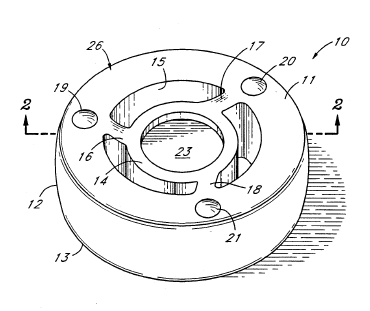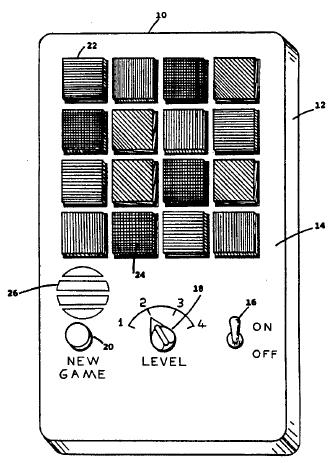The USPTO has announced a proposed rule that would reduce fees associated with filing a trademark application if the applicant follows certain rules that go beyond those normally required to receive a filing date. The program, termed ‘TEAS Plus’ would reduce the application fee by $50 to $275 per class.
Notice — USPTO Patent Database Temporarily Unavailable
Keep track of terminal disclaimers
Patent Office Director, Jon Dudas, to Announce Improvements to Patent Process
At Friday's Town Hall Meeting on Patent Reform in Chicago, Jon Dudas, the Director of the U.S. Patent & Trademark Office is expected to announce a number of new initiatives to improve patent quality, decrease pendency time, and decrease patent prosecution costs. According to Bridgid Quinn, the PTO's Public Affairs Chief, "one program will save patent applicants $30 million annually."
PTO Adds To Advisory Committee
The Patent Public Advisory Committee consists of a group of individuals selected by the Commerce Secretary (Gutierrez). The committe's purpose is to advise the Director of the PTO (Dudas) on the management of operations of the Office. Three new members have been appointed to serve their three-year term:
USPTO: There’s No Such Thing As A Free Priority Document
USPTO: Still No Patent on Life Containing Human Cells
Stuart Newman was in the news last week. Newman, a professor of biology at the New York Medical College, filed several patent applications on chimeric embryos and animals containing human cells. For instance, in the most recent application, Newman claimed the following:
USPTO: Changes in Reexamination Policy
It is quite common that a party hoping to enforce a patent will discover that some important prior art was not cited during prosecution, either because the inventor did not know of the reference or because it was not considered important at that time. However, it is becoming increasingly common to request the Patent Office to take a second look at the patent before the assignee tries to enforce it against infringers. The second look comes either through a reexamination or a reissue proceeding.
STOP!: Department of Commerce Announces Bold Strategy to Crush IP Piracy
The USPTO and Department of Commerce have vowed to "MAKE THE WORLD A MISERABLE PLACE FOR MODERN-DAY PIRATES."
USPTO Implements Changes to Patent Act: Cooperative Research
The USPTO has released an interim rule of practice that implements provisions of the CREATE Act that amended 35 U.S.C. 103(c). (Published at 70 FR 1818). The purpose of the Act is to promote cooperative research -- such as between a university and start-up company. The main thrust of the new law is to exclude some prior art from obviousness (103) consideration if the prior art arose from a joint research agreement.
New Leadership at the Patent Office
USPTO Director Jon Dudas has announced three new Deputy Commissioners for patents:
USPTO Changes Trademark Fees
[Link] Effective January 31, 2005, trademark fees are changing:
New Patent Fees In Effect: Consolidated Appropriations Act, 2005 enacted on December 8, 2004
Consolidated Appropriations Act was signed by the President and enacted into law on December 8, 2004. The Consolidated Appropriations Act revises certain patent application and maintenance fees; provides separate fees for a basic filing fee, a search fee, and an examination fee; and requires an additional fee for any patent application whose specification and drawings exceed 100 sheets of paper (application size fee). The new patent fees are now effective and will remain in effect during the remainder of fiscal year 2005 and during fiscal year 2006. The patent maintenance fee changes apply to any maintenance fee payment made on or after December 8, 2004, regardless of the filing or issue date of the patent for which the fee is submitted. The revised maintenance fees took effect on December 8, 2004. Thus, any maintenance fee paid at any time on (or after) December 8, 2004 is subject to the revised maintenance fee amounts set forth in the Consolidated Appropriations Act.
Patentees Risk Loss of Rights in Patent Office Fee Structure Change
The new fees USPTO fees will go into effect on the day that the legislation is signed by President Bush. In a recent report, the AIPLA noted that maintenance fees create the greatest risk of getting caught by the fee change-over.
PTO releases new power of attorney form.
Thanks to Bill Heinze at I/P Updates for filling me in on the PTO's recently updated power of attorney and correspondence address form.
E-Forms Now Available For Madrid Protocol Trademark Filings
Provisional Patent Applications Available Through Public PAIR
Link: The PTO has announced that most provisional applications that have been relied upon for their filing dates in subsequent applications are now available over the Internet through Public PAIR. The provisional applications are only publicly available if they are relied upon by an issued patent or a published patent application.
Doctrine of Equivalents for Means-Plus-Function Claims Limited to “After Invented Technology.”
MPEP Online Version
Link: In May 2004, the USPTO released a new revision of the Manual of Patent Examining Procedure (MPEP, 8th ed., rev. 2). For several months, the electronic version was only available in PDF format. Now, the Office has released each chapter of the MPEP in HTML. The HTML version is much smaller (less diskspace) and can be searched much more quickly.

